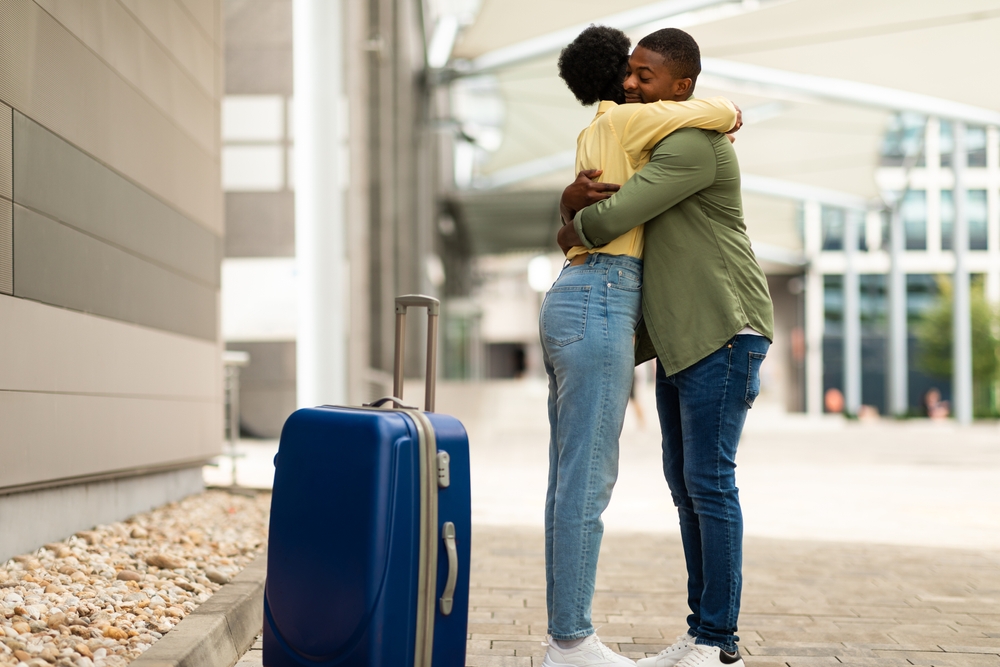When spouses or partners have to spend time apart, it can leave a gap in their support structures and put a strain on the relationship itself. But are long-distance relationships and loneliness inevitably linked? Here are things that you can do to maintain intimacy and avoid loneliness even while living apart.
Are Long-Distance Relationships and Loneliness Inevitable?
Feeling lonely while your partner is away is natural. Many people may find that they miss their partners at specific times of day or on special occasions or holidays. That feeling that someone important is missing can make long-distance relationships and loneliness seem inevitable. The loss of physical touch and closeness, plus the different experiences and stressors put on each partner can all put strain on a relationship. But that doesn’t mean that loneliness is inevitable in a long-distance relationship. There are things couples can do to maintain their relationship and give one another support even over large geographic distances.
Get help maintaining intimacy in a long-term relationship.
Talk to a psychotherapist about coping strategies to deal with the strain of long-term relationships today.
Psychological Challenges from Long-Distance Relationships
In addition to loneliness and sadness, long-distance relationships can present a number of psychological challenges for one or both partners. Depending on each of your mental health circumstances, the strain of a long-term relationship could cause or aggravate existing symptoms of:
Whether intentionally or not, many partners who struggle with mental health concerns find psychological support from their spouses or partners. They may turn to their partners as a sounding board, or involve them in their coping mechanisms. When business trips, school enrollment, or other life events force couples into long-distance relationships, that support structure can be strained and partners can face an increase in psychological symptoms as a result.
Maintaining Intimacy in the Face of Physical Distance
Loneliness isn’t just a result of isolation or solitude. Couples can find they are lonely together. Similarly, many couples manage to maintain intimacy even while spending time apart. While the most obvious concern for many couples is physical and sexual intimacy, distance can also strain a couple’s emotional intimacy and even trust in one another. Still, couples can maintain intimacy in the face of long-distance relationships. Through a commitment to staying emotionally and physically connected, partners can maintain intimacy even when living miles and hours apart. This requires conscious effort and intentional work, but it can be done.
Ways to Avoid Loneliness While in a Long-Distance Relationship
Maintain Consistent Contact
Communication is important in any relationship, but it is critical in long-distance relationships. You should schedule regular check-ins – many couples do nightly calls or early morning text messages. These regular contacts can help stave off loneliness by reminding one another that you are there to support each other, even at a distance. In addition, you should make time for longer “deep talk.” This commitment to open communication will make space to maintain your connection with your partner, in which you can maintain your emotional intimacy and rebuild the support needed to maintain faith and trust in one another.
Take Time to Develop as Individuals
In cases where one spouse travels for work or partners spend time together and apart, one strategy to avoid loneliness is to use the time apart to develop as individuals. This could include engaging in hobbies, learning new skills, or practicing mindfulness. You can also use your time alone to focus on your own physical health, exercise or sports. This can help avoid loneliness by giving you constructive things to focus on other than your partner’s absence.
Openly Communicate About Feelings
Many couples in long-term relationships can struggle with effective communication as a result of their distance and time apart. It is important to practice and develop strong communication techniques, including active listening, reassurance, and clear expectations. To maintain intimacy and avoid loneliness and trust issues, you should be transparent and openly talk about all your feelings – including distrust or jealousy. Talking through each partner’s responses to events and interactions can help you process those emotions and set healthy boundaries to protect your relationship.
Share Virtual Dates and In-Person Visits
Relationships are built on shared experiences. That doesn’t change when the partners are living apart. If you want to avoid feeling lonely during a long-distance relationship, you should find ways to build those experiences together. In modern times, there are a variety of online options, from video games to video conferencing, that can let you do things together. However, to maintain physical intimacy, you should also plan in-person visits whenever you can. Prioritize holidays and important dates such as birthdays and anniversaries, as well as times that challenge one or both of you, because physical distance can make those challenges more difficult. Make these visits special so they can serve as anchor memories to make it easier to spend time apart in between.
Use Short-Term Therapy to Supplement Support Systems
If you are struggling with loneliness because of a long-distance relationship, it is okay to get help. The effort it takes to maintain intimacy across the distance can be challenging, especially if you also have mental health challenges. Engaging in short-term therapy with a skilled psychotherapist can help you develop improved communication techniques and coping mechanisms. This can make it easier to cope with the strain that comes with a long-distance relationship, and make it easier more likely that your relationship will survive your time apart.
David Stanislaw is a psychotherapist with over 35 years of experience. He helps individuals and couples, teens, and children, deal with the strain of long-term relationships through short-term therapy or ongoing counseling. Contact David Stanislaw to get help today.


 Common Treatments for Depression
Common Treatments for Depression Are Childhood Family Patterns Affecting Your Marriage?
Are Childhood Family Patterns Affecting Your Marriage? 7 Ways Therapy Can Make You a Better Parent
7 Ways Therapy Can Make You a Better Parent